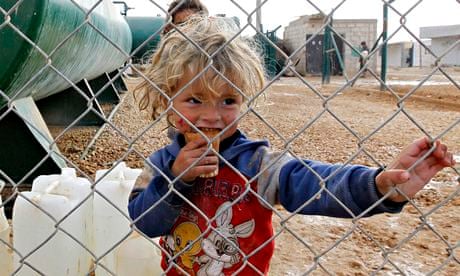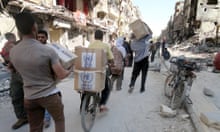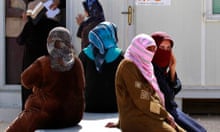Political and diplomatic efforts to deliver humanitarian aid to Syria have "tragically and lethally" failed, leaving millions in the war-ravaged country without food, water, medicine, blankets and clothing, international charities have warned.
In a joint letter to the Guardian, 12 NGOs - including Save the Children, the International Rescue Committee, Doctors of the World UK, and the Norwegian Refugee Council - are calling for a new approach to reaching the 10 million Syrians in urgent need of help.
"Ninety days ago, the UN security council unanimously adopted a resolution to relieve suffering in Syria by requiring that humanitarian assistance be provided through the most direct routes possible," says the letter, published on Friday. "It is clear that the resolution has failed to achieve this objective: its demands have been ignored by the warring parties and people continue to be deliberately denied access to life-saving aid.
"The humanitarian situation is deteriorating, violence escalating and diplomatic efforts to bring about a negotiated solution have failed."
Given the failure of resolution 2139 to tackle the humanitarian crisis created by Syria's three-year conflict, say the NGOs, the international community must think again – and act fast. "Efforts should focus on securing local ceasefires among the parties to the conflict – through meaningful negotiations not siege tactics and starvation strategies – so that aid can be delivered, economies restarted and dialogue to find a longer-term solution to the crisis renewed," they say.
Although the charities acknowledge that it is not their job to tell politicians how to restore access to conflict-hit routes, they add, "it is our role to highlight when their failure to do so is so tragically and lethally costly".
The letter ends with a stark warning: "The world has stood aghast as Syrians clamour for an end to their suffering. History will be generous to those that answer their call and unforgiving to those who turn away."
Hopes that resolution 2139 would ease the suffering in Syria have proved short-lived. Speaking shortly after it was passed, the UN secretary general, Ban Ki-moon, said: "This resolution should not have been necessary. Humanitarian assistance is not something to be negotiated; it is something to be allowed by virtue of international law."
But last week, Mercy Corps, one of the signatories to the letter and one of the largest aid providers in Syria, confirmed it had been forced to scrap its operations in Damascus because Syrian officials said the group could not work in opposition-held areas of the country.
"We are deeply disappointed by the closure of our Damascus-based operations," said the aid group's spokeswoman, Cassandra Nelson. "Since 2013, Mercy Corps has also maintained aid-delivery operations from Damascus into south-central Syria – with the consent of the Syrian government – serving more than 350,000 affected civilians."
The NGO has also been delivering aid to the rebel-held north, reaching more than 1.7 million civilians and making it the largest provider of relief to opposition areas.
Aid has been routinely denied to some opposition areas, such as the Yarmouk Palestinian camp in Damascus, and in the old city of Homs, which was retaken by Syrian forces in late April after a crippling siege. Some opposition fighters and their families who were allowed to leave as part of a surrender deal say they were starved into submission.
In an interview with the Guardian a week ago, Ban Ki-moon's predecessor, Kofi Annan, said diplomatic and political attempts to end the fighting had repeatedly been thwarted, leaving tens of thousands of Syrians dead.
"They have been stymied because of the divisions at the national level, the regional level, and the level of the UN security council," he said. "So we've let the people of Syria down. While we are divided and pointing fingers and accusing each other, they are paying with their lives."







